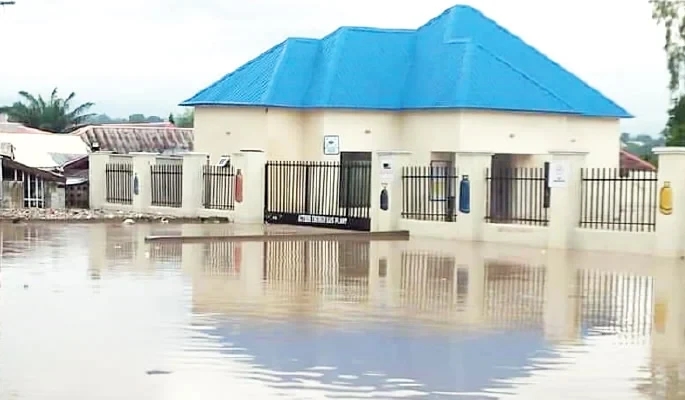Residents of some communities in Taraba State are still counting their losses after downpour submerged houses last Saturday, reports JUSTIN TYOPUUSU
Friday last week was like any other day for the residents of Taraba State who went about their normal business. The sudden change in weather at about 11pm, resulted in rain, which was welcomed by residents who envisaged a cool atmosphere overnight.
Some of the residents told our correspondent that flooding accompanied the rain which subsided after more than four hours. The rain, which lasted till the early hours of Saturday, caused damage to homes and farmlands in Lau, Jalingo, Karim Lamido, Gassol, Wukari and Ibi Local Government Areas, leaving about 300 houses submerged and farms washed away.
A resident of Mayo-Gwoi in Jalingo city who just returned from a business trip in Kano, Mr Tanko Aji, was deep asleep when his wife woke up to help her evacuate their house valuables. Aji said he woke up to discover his house was water logged.
He said, “If not for my wife, the situation would have been bad. Our children were sleeping on a lower bed, and the water level had already reached them. We quickly took them to safety, and before we could return, the water had taken over our house.
“We lost everything to the flood. The goods I bought in Kano and other valuables were all washed away, but we thank God no life was lost. My rice farm in Wukari Local Government Area I was told was also washed away.’’
Following the rain, communities at the river banks in the state were also affected, and the affected residents still counting losses after the downpour affected houses and farmlands.
Samuel Babaji, whose rice farm located close to the Dangote Sugar Plantation in the Lau Local Government Area of Taraba State was washed away, told newsmen that his investment for the year was gone.
Babaji said, “Usually, heavy rains come between September and October and by then, rice planted in the valley of the river Benue grows above the level that it could be washed.
“Unfortunately, we had a downpour this year in early July which has affected many of us farmers. I want to plead with the relevant authorities to come to our aid.”
In Jalingo, the state capital, houses, shops, bridges and streets were flooded till Sunday afternoon before the people could have access to some parts of the city following the intervention of the Red Cross officials who worked relentlessly to clear the debris on the road and remove blockages.
The major road leading to the city centre was blocked by the flood for several hours, forcing workers to find an alternative route to the city centre. Checks by our correspondent showed that about seven communities in Jalingo Local Government Area alone were ravaged by the flood. Some of the worst-hit areas are Mayo Gwoi, Abuja Phase II, Nukkai, Barde and part of Abuja Phase 1.
Some of the residents who spoke with to our correspondent blamed the disaster on a poor drainage system in many parts of the state capital, noting that there had been consistent flooding at the river bank, which both federal and state governments didn’t attend to for years.
A village head of Abuja Phase II, told newsmen that many of the affected residents had yet to return to their homes for fear of more rains.
Speaking through Garba Aliyu, Sunday said that over 100 houses were destroyed in the community, including property worth millions of naira.
A widow, Mrs Fatimatu Shamaki, a resident of Nukkai, who spoke to our correspondent, said she sent his seven children to stay with her sister in Sunkani, pending when she would mend her flooded apartment.
Worried by the development, Governor Darius Ishaku, who was in Abuja on official assignment, cut short his trip and returned to Jalingo to inspect the damage caused by the flood.
Ishaku, who drove straight from Danbaba Suntai Airport to the flood-affected areas, sympathised with the victims and promised to initiate means of assisting those who were rendered homeless.
The governor called on the Ministry of Land and Survey to be proactive in giving direction to those constructing houses at the river bank and waterways to curb a future recurrence of the incident.
“This disaster deeply saddens me, I feel your pain, and I sympathise with you on this downpour and flood that rendered many people homeless. We must assist the victims and relocate them to safer areas to avoid a repeat of the incident. I call on the Federal Government and non-governmental organisations to come to our aid. But, unfortunately, aids from the Federal Government don’t get us, and even if they do, they come through some proxies, which is a bad procedure.
“Last week, I understand the Ministry of Humanitarian Affairs officials were here, sharing money with people. I tried to get to the minister, but I couldn’t get her.
“Generally, assistance from the Federal Government doesn’t get to us in Taraba and even when it does; it comes through some certain proxies. This is an unknown procedure.
“Any help that is coming to Taraba should come through the government. We have established ways of doing things in the state. For example, we have the State Emergency Management Agency and the ministry of Humanitarian Affairs exists in the state.
“I see no reason why the Ministry of Humanitarian Affairs cannot liaise with its counterpart ministry in the state to reach out to the people.”
It was discovered that some of the drainages in Jalingo metropolis were blocked after the flood.
An official of the State Ministry of Environment told our correspondent that a memo had been forwarded to the governor for approval to enable the ministry mobilise to clear the blockages and remove some of the structures built on waterways within the city to avoid a repeat of the incident.

